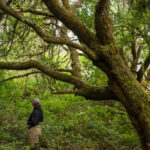Abstracts: GMO Mosquitoes, SpaceX, and More
• The U.S. owner of British company Oxitec has formed a PAC to promote the release of controversial genetically-modified mosquitoes in Key West, Florida. The company says that the mosquitoes will help fight diseases like Zika, but voters will vote on the issue in a non-binding referendum this November. (Miami Herald)

• A SpaceX rocket exploded at Cape Canaveral on Thursday, two days before it was set to launch a communications satellite that would have improved internet access across Africa. (NPR)
• Colorado environmentalists may have forged some signatures in order to try to get a question about fracking on the November ballot. (Denver Post)
• President Obama will be a guest-editor for the November issue of Wired Magazine. According to Wired, this will be the first time any magazine has been guest-edited by a sitting president. (Wired)
• According to a new study, populations of African forest elephants could take a century to recover from poaching. (Christian Science Monitor)
• The development of an “artificial pancreas” is exciting to some, but a new study says testing of the device has largely excluded a major segment of the population that might use it: people of color. (Reuters)
• A review of the procedures done by a renowned Italian stem-cell researcher has concluded there were numerous problems, including inadequate informed consent by patients. (Associated Press)
• Researchers believe that they may have found fossils of ancient life in Greenland rocks which, if confirmed, would be more than 200 million years older than the oldest known fossils. (BBC)
• And finally, social media was buzzing with news and photos of 300 reindeer killed by a lightning strike. But such animal deaths are not unusual — and they might become more common in the future. (Slate)










